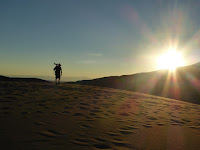WELCOME TO GREAT SAND
DUNES NATIONAL PARK
EXPLORING DUNES, GRASSLANDS,
FOREST, LAKES AND ALPINE PEAKS
September 20-21
 Looking for a surreal beauty experience in the middle of
nowhere? Your first question will be why are these Sahara like dunes in
Colorado?
Looking for a surreal beauty experience in the middle of
nowhere? Your first question will be why are these Sahara like dunes in
Colorado?
These are the largest sand dunes in America and they are nowhere near
the ocean. It's rather interesting how the sand got here and settled for miles
between mountain ranges. As you drive in south central Colorado you can see the
dunes from miles away. Stopped here enroute to New Mexico from Colorado
Springs. We came up here just to see the park. Like most national
parks, we were not disappointed.
These dunes in the middle of the desert, mountains of sand
against the backdrop of the mountains are something to see. While a beautiful anomaly in the
mountains, there wasn't that much to do or see – unless of course you were a
serious hiker or sand boarder.
750-foot tall sand dunes rise
out of the base of mountains in southern Colorado are well worth your time to visit
and are a spectacle to behold. The scenery is absolutely gorgeous! The views
were absolutely gorgeous like being in the middle of the Sahara instead of near
the mountains in Colorado. Fall is absolutely beautiful and the best time to
visit happened to be September when we found camping space available without a
reservation.
The first day we hit the trail
roads around the dunes. Those equipped with 4WD can extend their visit along a
rough, ungraded road that leads deep into the park, with access to other dune
fields and mountain trails. JR loves to take roads less traveled by. Naturally
he drove us on a rough sandy narrow road, just shy of the Point of No Return. To
go past that, one needed a high clearance 4WD. However he did use good judgment
and turned back knowing our Jeep Liberty wasn’t up for the challenge. In fact,
there's a lot of the park you can't see without a 4WD, which is unfortunate. This
national park is unique in including mountains, 700' sand dunes, and wetlands
in the same habitat. There is a good visitor center and informative orientation
video.
Early mornings and late
afternoons offer the best times for photography, when the dunes come alive in a
constantly shifting play of light and shadow. You can either hike the dunes, or
hike the forests that are full of streams. The dunes are amazing. They just
rise up from the ground against the mountains like it's the most natural thing
in the world.

We parked at the Dunes
Parking area, grabbed cameras in tow, crossed a very shallow creek and hiked as
far as time would allow until after sunset. The hike across Medano Creek was
basically dry to the base of the dunes to catch the early evening light.
Our best photos were at sunset to get
the play of light and shadows on the dunes. Actually the sand was no harsher
than that of the average beach. Climbing the dunes is far harder and more
strenuous than it looks--you tend to slide back a foot for every two you
advance. It's hard on the calves but a good workout.
 |
| Sitting down to wait for the sun to set on the horizon |
 |
| Voila the moment came |


 |
| Medano Creek at the sand dunes |
The following morning a hike
at sunrise up the shallow creek bed showed a few birds about and lots of animal
tracks in the sand from critters seeking water after dark.

It's just amazing
what nature is capable of, so definitely a must-see if you're in the area. It
is a great place for star gazing in a pitch-black night sky too.
Bottom line,
the park is worth a visit and such a random thing to behold in the middle of
nowhere.











